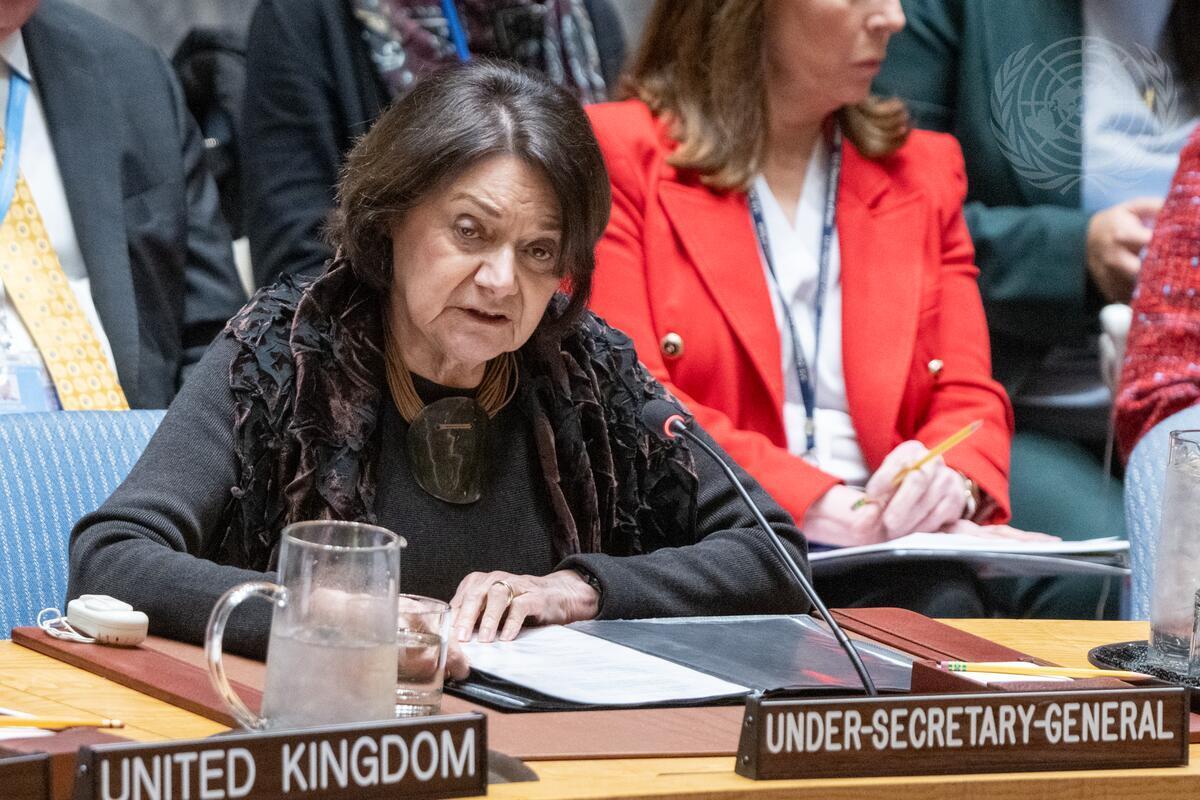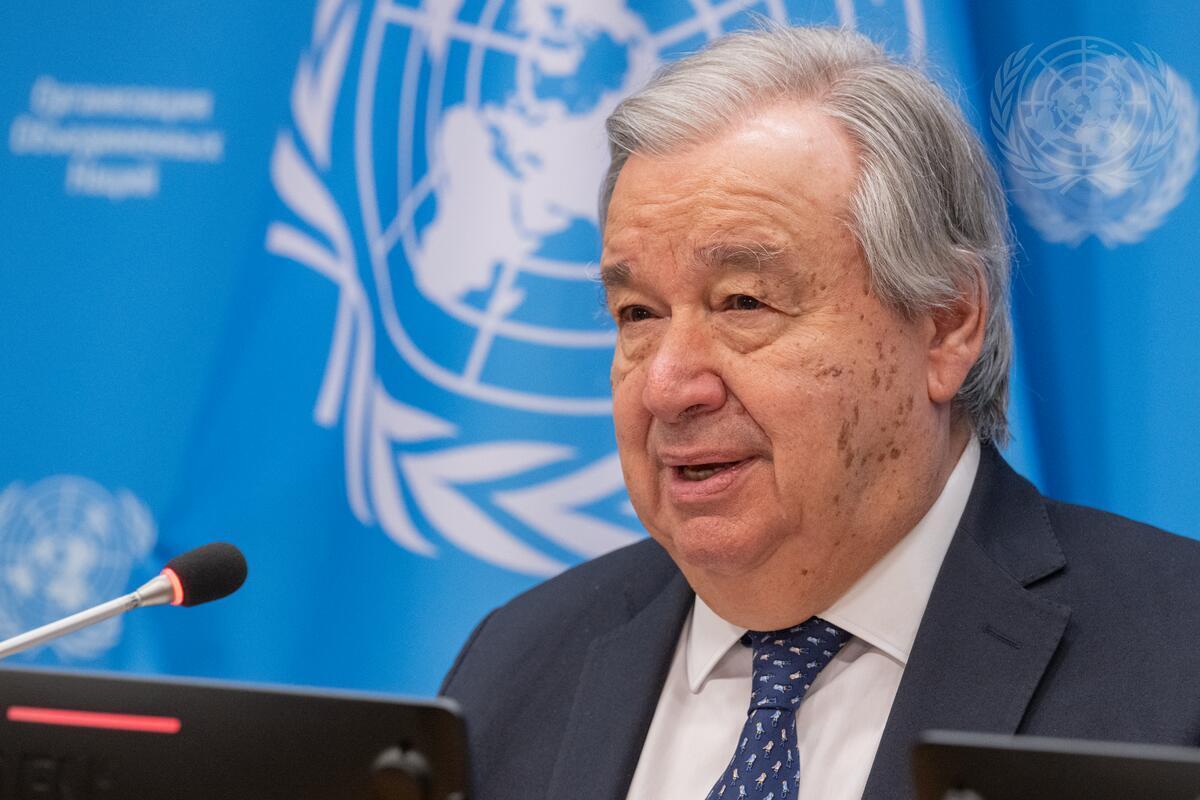Madam President,
Members of the Security Council,
This past month, we were reminded again of the volatile security situation in the Occupied Palestinian Territory, as yet another deadly escalation between Israel and Palestinian armed factions in Gaza took place.
While the ceasefire is holding, conflict mitigation efforts must also be met with steps by both sides – supported by the international community – to reset a trajectory out of the cycle of violence. I call on all parties to stop unilateral and inflammatory actions that undermine prospects for peace, and to address the acute financial and institutional challenges facing the Palestinian Authority.
I am particularly alarmed by the funding crisis facing UN agencies supporting basic services and social support, including emergency food assistance, to Palestinians. Without new funding, World Food Program will suspend cash assistance to some 200,000 Palestinians next week and UNRWA will not have the resources to deliver core services in September. This comes alongside existing financial challenges facing the PA and declining donor support overall. I encourage Member States to immediately seek ways to increase their support to Palestinians, including funding to UNRWA and WFP, without which we will face serious humanitarian and, potentially, security challenges.
There is no time to spare.
Madam President,
Tensions increased between Israel and Palestinian armed factions in the Gaza Strip on 2 May, when a Palestinian Islamic Jihad (PIJ) leader, Khader Adnan, died in an Israeli jail following an 86-day hunger strike. In response, PIJ and other armed factions in Gaza fired over 100 rockets towards Israel, causing damage but no injuries. The Israeli Air Force responded with airstrikes against what it said were Hamas and PIJ targets in the Strip, killing one Palestinian and causing damage. Following intensive efforts by Egypt, Qatar and the United Nations, hostilities ended on 3 May.
One week later, in the early hours of 9 May, the Israeli Air Force carried out airstrikes in Gaza that killed three senior members of PIJ’s military wing in their homes; Israeli officials said the three were responsible for firing the rockets on 2 May. The strikes, against residential structures, also killed ten civilians – family members and neighbors – including women and children.
Over five days, Israel conducted 323 airstrikes against what it said were PIJ military targets in Gaza, while Palestinian militants, mainly PIJ’s al-Quds Brigades, launched over 1,200 rockets and more than 250 mortars towards Israel, of which nearly 300 fell short within Gaza and more than 400 were intercepted by Israel’s aerial defense system.
Thirty-three Palestinians, including at least 12 civilians – four women and six children – were killed during the hostilities. Of those, one Palestinian worker was killed in Israel by rocket-fire from Gaza and the UN is verifying reports that at least three fatalities were due to rockets falling short within the Strip. According to the Ministry of Health in Gaza, 190 Palestinians were injured, including at least 38 women and 64 children. One Israeli civilian woman was killed by rocket-fire. According to Israeli authorities, six Israelis were moderately injured and 89 lightly injured.
The escalation compounded the already dire humanitarian situation in the Strip. According to authorities in Gaza, nearly 100 housing units were completely destroyed and more than 125 were damaged and rendered uninhabitable, displacing more than 1100 Palestinians.
Israeli authorities closed both crossings between Gaza and Israel, preventing the entry of food, medical supplies and fuel for the Gaza Power Plant. As a result, hundreds of patients were unable to access essential medical care in the West Bank or in Israel.
Throughout, the United Nations engaged intensively with all parties, alongside efforts by Egypt, together with regional and international partners, including Qatar, to end the hostilities and prevent further loss of life. I commend Egypt for its role in bringing the parties to a ceasefire.
Madam President,
I am deeply concerned that civilians continue to bear the brunt of such hostilities. I am particularly appalled that children, who must never be the target of violence, continue to be victims.
I echo the Secretary-General’s condemnation of the unacceptable loss of civilian lives and his call on Israel to abide by its obligations under international humanitarian law, including the proportional use of force and the taking of all feasible precautions, to spare civilians in the conduct of military operations.
I also reiterate the Secretary-General’s condemnation of the launching of indiscriminate rockets from Gaza towards Israel, including from densely populated residential areas, which violates international humanitarian law.
Madam President,
Turning to the occupied West Bank, including East Jerusalem, the level of violence remained high.
Seventeen Palestinians, including two children, were killed and 138 Palestinians, including two women and 23 children, were injured by Israeli security forces during demonstrations, clashes, search-and-arrest operations, attacks and alleged attacks against Israelis, and other incidents. Another 24 Palestinians, including two children, were injured by Israeli settlers or other civilians in shooting attacks, stone-throwing and other incidents.
Thirty-three Israeli civilians, including four women, as well as four Israeli security forces personnel were injured by Palestinians in shooting and ramming attacks, clashes, the throwing of stones and Molotov cocktails, and other incidents.
As in previous months, many Palestinian casualties occurred in the context of Israeli military operations in Area A and subsequent armed clashes. On 4 May in Nablus, ISF killed three Palestinian members of Hamas’ military wing, who, according to ISF, were responsible for the April killing of three Israeli civilians in the Jordan Valley. ISF also killed three Palestinians during an operation in Qabatiya, south of Jenin, on 10 May, one of whom was an unarmed bystander.
Three Palestinians were killed while carrying out attacks or alleged attacks against Israeli security forces: an alleged ramming attack near Salfit on 27 April, a stabbing attack in Huwwara, near Nablus, by a Palestinian woman resulting in light injury on 4 May; and an alleged stabbing attempt at a checkpoint west of Jenin on 13 May.
During the reporting period, Israeli forces imposed significant movement restrictions, particularly around Jericho, Nablus and Hebron following either Palestinian attacks or stone throwing – affecting tens of thousands of Palestinians and their local economies.
Thousands of right-wing Israeli activists, including senior Government Ministers, participated in the highly provocative annual “flag day” march through Jerusalem’s Old City, marking Jerusalem Day. Many chanted racist slogans, including “Death to Arabs,” with scuffles breaking out between Israeli participants and Palestinians. Israelis also threw bottles and other objects towards media covering the event, injuring two journalists.
Such provocations and incitement – which continued in the days after the march - are unacceptable and must be condemned by all. I also reiterate that the status quo at the Holy Sites must be respected.
Levels of settler-related violence also remained high, with five Palestinians shot and injured by Israeli settlers using live ammunition.
I reiterate that all perpetrators of violence must be held accountable and swiftly brought to justice.
Security forces must exercise maximum restraint and use lethal force only when strictly unavoidable to protect life.
Madam President,
From 3 to 4 May, the Ad Hoc Liaison Committee convened in Brussels, where the parties and donors discussed measures to support Palestinian institution-building and strengthen the Palestinian Authority (PA) and economy. The Chair’s summary called on both sides to implement previous agreements between them, commit to de-escalation and refrain from steps that undermine Palestinian institutions and the two-State solution, while calling on the international community to increase assistance to Palestinians, including through support to UNRWA.
Madam President,
I regret to observe more settlement plans being moved forward, with tenders published for some 310 housing units in Area C and demolitions continuing.
On 18 May, the Israeli military issued an order – in line with the Knesset’s March amendment to the 2005 Disengagement Law – to allow Israelis to re-enter the area of the evacuated settlement of Homesh, built on private Palestinian-owned land in the northern West Bank.
During the reporting period, Israeli authorities demolished, seized or forced owners to demolish 33 Palestinian-owned structures in Area C and 17 in East Jerusalem, including a donor-funded school east of Bethlehem, displacing 89 Palestinians, including 45 children.
The demolitions were carried out due to the lack of Israeli-issued building permits, which are nearly impossible for Palestinians to obtain.
On 7 May, Israel’s High Court of Justice rejected a petition to compel Israeli authorities to carry out demolition orders against the Palestinian village of Khan al-Ahmar. The justices agreed with the Israeli Government’s position that the court should not intervene in setting a timeline for the demolition. The court also agreed that the demolition should not be carried out at this time, citing Israel’s security and foreign relations.
I reiterate that all settlements are illegal under international law and that they are a substantial obstacle to peace and must stop.
I also call on Israeli authorities to end the displacement and eviction of Palestinians and to approve plans that would enable Palestinians to build legally and address their development needs.
Madam President,
Turning to the region, on the Golan, while the ceasefire between Israel and Syria has been generally maintained, the situation continues to be volatile due to violations of the 1974 Disengagement of Forces Agreement by the parties.
The situation along the Blue Line remained stable following the 6 April breach of the cessation of hostilities.
Madam President,
In recent weeks, the UN, together with regional and international partners, mobilized once again to end hostilities between armed factions in Gaza and Israel. Such efforts are crucial to saving Palestinian and Israeli lives.
Nevertheless, we must also keep issues fundamental to creating the conditions for a lasting peace at the forefront.
The immediate priority is to support steps to bolster the PA and preserve critical services for the Palestinian people. These steps should be implemented in a way that encourages the parties to engage with each other, including on underlying political issues.
This requires greater efforts by Israeli and Palestinian leaders, alongside increased support and attention from the international community.
We must take action -- not only to ensure Palestinian well-being and governance, but as an integral part of ending the occupation and restoring a political horizon toward a viable two-State solution, based on UN resolutions, international law and previous agreements.
Thank you.






